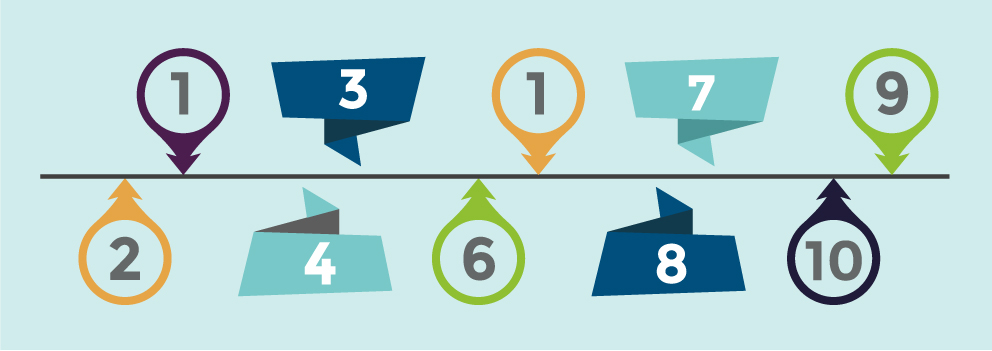Careers advice and information for West Sussex
Top 10 things not to do in a job interview

We've been asking local employers for tips on what to do in an interview – and, of course, what not to do! Here are our top 10 not to do in that all-important job interview.
1. Don't go in unprepared
No matter how busy you are in the run up to the interview, don't cut corners on your research. It's vital that you go into any interview with as much knowledge as possible about the company, your employer and your potential new role. It will be obvious to the interviewer if you're badly prepared, so make full use of the internet and social networks such as LinkedIn well in advance, and know exactly who you're dealing with. Take time to assess the industry, too, so you're fully aware of the competition and where your company stands in its market.
2. Don't be late
There are no two ways about it: if you're late, unless you've rearranged this in advance, you're putting yourself at a disadvantage before you begin. Leave bags of time. Equally, if you're hours early, don't spend all of that time sat waiting in the company's reception...
3. Don't go casual
Even in a relaxed company, the interview is the time to make an excellent first impression. Professional attire is the normal dress code, or if it's the kind of interview where a suit would look odd, ensure you're extremely well-presented. That goes for the materials you take with you, too – prepare extra copies of your CV and references, and make sure any folders are smart – leave that One Direction stationery at home.
4. Don't give the wrong impression
Avoiding eye contact, slumping or having a weak, sweaty handshake are all big no-nos. It's common sense, really – you need to strike the interviewer as confident and capable, so walk tall, greet the interviewer with a smile and a firm (but not crushing) handshake, meet their eyes and sit in a positive stance, without fidgeting. If you're prone to nerves, take a few deep breaths before you go in, and talk yourself into a more comfortable state of mind (not out loud).
5. Don't be negative
Normally, it's good to tell the truth. But if the truth is that you're looking for a new job because you hate everyone in your current employment and the mere sight of your boss makes you want to harm someone, keep it to yourself. Even if you have justified grounds for thinking the management needs a restructure, or you want to emphasise the difference between your old company and the new one, being negative is a surefire way to turn your interviewer off. Focus on the positives, and continue to make a winning impression.
6. Don't rush
Think before you speak. It's preferable to admit that you need time on a question, or that you don't know something, rather than rambling off at a tangent or trying to 'blag' an answer and coming across as vague or cliched. You probably do have a great answer, the key thing is to arrive at it in a calm, measured fashion! Equally, if you know you're likely to freeze, practise some standard answers beforehand, so you have a framework to fall back on if you struggle to think under pressure.
7. Don't be caught out by your own CV
Know that CV like the back of your hand, and be prepared to answer questions on all aspects of it. If there is something you know you won't want to dwell on, like any gaps, or jobs you're not proud of, think about how you can turn things into positives so you won't be daunted or flustered if they do come up.
8. Don't treat it like a social occasion
No matter how confident you feel about your interview success, don't slip into an unprofessional, over-friendly, or – heaven forbid – flirty, tone. Remember why you're there, and don't presume that you'll be the chosen candidate. Concentrate on demonstrating that you'll be an asset to the company. It's also important not to overshare. The interviewer may have to see several people in a row and they won't have time to hear your entire life story. It's not the X-Factor, after all…
9. Don't take a back seat
No-one wants to employ a wet lettuce. If you're qualified for the job and you're interested in the job, show it by getting involved in the interview. Plan intelligent questions in advance and remember that it should be a two-way process – be inquisitive about the role that you're trying to get. You should be paying attention to everything the interviewer says and reacting to it, so it's very much a dialogue, rather than a monologue from either side.
10. Don't relax (too much)
Some employers recommend ending the interview by telling the interviewer how much you want the job and concluding that you think you would be a good fit – it may give them the opportunity to give you some insight as to their thought process, too. Either way, once it's over, don't relax. It's become normal to follow up with a brief email, thanking the interviewer for their time and reiterating your interest in the role. It shows you really want it. Just don't make it a begging letter
Please share this article with your friends on Facebook - thank you.
Much of the advice on our website has been kindly provided by local companies and organisations for which we are very grateful - could you offer some advice to our visitors in return for some free coverage on our website? If so please get in touch here as we'd love to hear from you.
Careers Advice
We work with experts in and around our local area to provide useful information relating to careers advice - we hope you will find these articles to be helpful. You can view our news news archive here

Dealing with Redundancy - Part 5 - Finding a New Job
Once your redundancy is dealt with and any retraining has been undertaken you will probably need to find a new job. This can seem daunting, particularly if you have not had to look for a new
read more
Redundancy - Advice for Employers and Businesses
When we hear the word 'redundancy' it is natural to think of the impact that it will have on the person being made redundant with out regard for the difficulties inflicted upon the employer
read more
Dealing with Redundancy - Part 2 - Financial Advice
Do you know the tax implications of receiving a redundancy package and how to avoid paying unnecessary tax? If you are going to find yourself struggling financially do you know how to lessen
read more
Dealing with Redundancy - Part 1 - Knowing Your Rights
Do you know what redundancy package you are likely to receive? Do you know what the government stipulated minimum package is? As well as detailing the legal and financial aspects we will
read more
Dealing with Redundancy - Part 3 - Psychological Impact
Do you feel like you’ve lost your identity and can’t stop feeling negative? It is not only the practicalities of redundancy that need to be addressed. Redundancy can also have a massive
read more
Top 10 things not to do in a job interview
We've been asking local employers for tips on what to do in an interview – and, of course, what not to do! Here are our top 10 not to do in that all-important job interview.
read more
Dealing with Redundancy - Part 4 - Retraining and Development
Have you thought about a new career or improving upon the skills you currently have? In this article we will offers tips and advice on increasing your 'employability' through courses and
read more
10 Steps to Creating Career Opportunities
It's too easy to start looking in the job section of the paper and applying for everything that has an attractive salary, car or any other perks, before falling into this trap, be really
read moreWest Sussex Employment & Business News
When attending interviews it's always good to be up to date with what's happening in the local business and employment sector - we hope you'll find these selected news articles interesting
Tips for understanding the job application process
<font face="Arial, sans-serif"><font size="2">With so many job seekers applying for any one job in today's economic climate, it's good to have an understanding of what happens to your application once you've pressed the 'send' button.</font></font> ..read more
Why Write A Covering Letter When Applying for Jobs?
Your covering letter may well be the first thing potential employers see. It provides additional information on your skills, knowledge and experience and gives you the opportunity to highlight why you're the right applicant for ..read more
Where are the best and worst cities to find jobs in the UK?
Despite the job market currently looking rather promising since the financial crisis, there are still cities across the country where it's much easier to find a job. ..read more
Plans to Cut Police Jobs in Sussex
Sussex Police recently announced plans to cut jobs across the force with the aim of making huge savings and focusing on different ways of working. Jobs will be lost as a result of these changes; the Police aim to save over ..read more
Care workers triumph at awards
Fantastic care workers took centre stage at the West Sussex Care Accolades - the county’s care ‘Oscars’ - on Wednesday. ..read more
Reasons Why You should be Looking for Jobs in Coastal West Sussex
Fears for under 30's who could face a retirement in poverty
Lloyds bank announces job cuts
Potential job losses for government based workers
Council plans over 100 job cuts in the Youth Services team
What not to do in your West Sussex job interview
Top 4 questions asked at job interviews for West Sussex job seekers
Interview Tips to help you get that perfect job in West Sussex
The Recruitment Process to Fill your West Sussex Job
How can you find the right West Sussex job for you?
What is different about looking for jobs today in West Sussex compared to 10 years ago
Covering Letter hints and tips for when applying for jobs in West Sussex
Looking for a second job in West Sussex?
University of Chichester / The Univeristy of Sussex
Public Sector jobs in West Sussex
Information on local newspapers covering West Sussex
Example CV for people applying for jobs in West Sussex

Why should we choose you?
Sarah Matthews of SFM Consulting offers helpful hints an advice on why you are the best candidate for the position, and how to make the employer choose you for their new role!
read more
Shafts of the Purest Light
John G E Frye considers how it is we become successful, the many people we encounter along our journey and how they help along the way.
read more